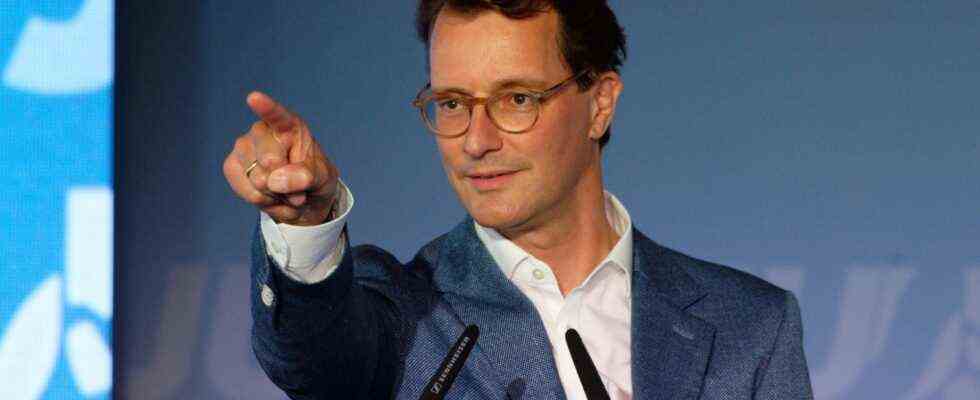portrait
Status: 05.10.2021 6:39 p.m.
Hendrik Wüst’s political career seemed almost over. Now he is to inherit Laschet as CDU state party leader and prime minister in North Rhine-Westphalia. It is also the story of an image change.
Hendrik Wüst would have almost become what is somewhat disparagingly called a “pure professional politician”. Someone who has never really had another job, which one assumes that he doesn’t even know the “real life”.
Wüst has made a steep climb in the NRW CDU. At the age of 15 he founded a local club of the Junge Union in his home in Rhede in the Münsterland. In his mid-twenties he became the regional head of the youth organization, and in his early thirties he became general secretary of the state CDU under the then Prime Minister Jürgen Rüttgers.
Hope bearers of the conservative wing
At that time, Wüst was seen as the bearer of hope for the conservative wing of the Union. He was primarily responsible for attacks – against political opponents, but also against party friends. He is said to have become abusive when something bothered him. His rhetoric tended to be sharp to dashing.
NRW Transport Minister Hendrik Wüst is to become the new Prime Minister
Jens Eberl, WDR, tagesschau24 7:00 p.m., October 5, 2021
In 2007 he teamed up with Markus Söder, among others. The two young pushers presented a position paper: “Modern bourgeois conservatism”. The “FAZ” spoke at the time of the “proof of rebellion”.
But then the ascent came to an abrupt end. Wüst had to resign in 2010 because of an affair about bookable sponsor appointments with Prime Minister Rüttgers. The episode “Rent a Rüttgers” made headlines across Germany. The fact that Wüst failed because of this also sparked glee. Shortly afterwards, the CDU lost the state elections in North Rhine-Westphalia.
Change to business
There followed a break in professional politics. Wüst switched to business after his crash. He is a lawyer and attorney and worked as a managing director at the publishers’ association, later also for private radio. He worked in the background on the political comeback. In 2013 he secured the leadership of the influential SME association in the NRW CDU. In 2017 Armin Laschet made him Minister of Transport.
Since then he has avoided the very loud tones. He says he himself now allows himself a moment to think things through. He is less belligerent and more careful with others. In fact, he emphasizes the team spirit. To date, he has not publicly claimed the post of Prime Minister.
There are people in the CDU who consider this to be a tactic. Who gossip about a policy of “drinking lots of little coffee”, alluding to Wüst’s ability to secure support in the background. And accuse the Wüst of not having given Laschet sufficient support in the federal election campaign.
“Man of Compromise”
But a large part of the North Rhine-Westphalian CDU is behind Wüst. And not just in the business-oriented wing of the party and in the Junge Union. The state chairman of the workers’ wing, Dennis Radtke, also supports him: “He is a man of balance who does not remain in ideological trenches,” says Radtke. Wüst understood that the character of the CDU as a people’s party could only be preserved if the entire spectrum of the party was visible.
This was also evident after the CDU’s defeat in the federal elections. Wüst tweeted a graphic. It shows that a particularly large number of voters lost the CDU and CSU to the SPD and the Greens. “With these electoral hikes,” wrote Wüst, “nobody should get the idea of wanting to move the Union to the right.”
A rejection to all party friends who dream of a conservative or radical market turn in the Union. Wüst, who once wanted to appear particularly conservative, presents himself as a middle-class man, one who wants to unite the various camps of the CDU instead of dividing them further. “There will be no quarrels like the CSU” in North Rhine-Westphalia, said Wüst in April after the dirty trial of strength between Laschet and Söder, “we will keep the place together nicely”.
As Minister of Transport, Wüst can look back on successes in North Rhine-Westphalia. He brought significantly more federal funds for roads and rails into the country than his predecessors. He has significantly increased spending on rail transport and, above all, on bike paths. He likes efficient, pragmatic solutions. It is a horror for him that trams in the Ruhr area still have different track widths.
Michael Heussen, WDR, on Laschet’s successor Wüst as Prime Minister of North Rhine-Westphalia
tagesschau24 7:00 p.m., October 5, 2021
Mother-in-law’s darling
Even in appearance, Wüst tries to strip off the image of the agitator. He appears smart and eloquent in interviews. He often smiles and wears fashionable suits, mostly without a tie. A mixture of a young entrepreneur and mother-in-law’s favorite. He also likes the hunt and likes to ride a bicycle, also in the government district in Düsseldorf. Since this year he is the father of a little daughter.
For the CDU, Wüst is an opportunity to be perceived as younger and fresher – without alienating traditionalists. It seems to have something for almost everyone. That’s good for an election campaign. In the coming months, Wüst will have the opportunity to implement this in government activities in North Rhine-Westphalia.

